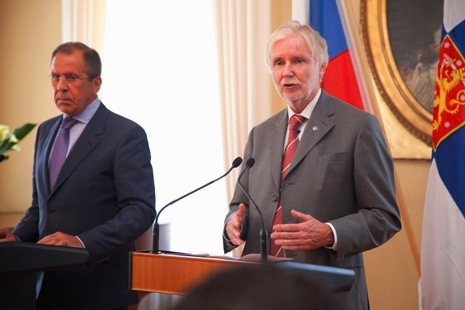
Finnish Leaders Emphasize Bilateral Cooperation and Good Relations with Russia
Finnish Leaders Emphasize Bilateral Cooperation and Good Relations with Russia
On August 20–23, Finland’s foreign policy establishment convened in Helsinki for the Annual Meeting of Heads of Mission. In addition to speeches by President Sauli Niinisto and Foreign Minister Erkki Tuomioja, visiting Russian Foreign Minister Sergei Lavrov was given the opportunity to give a short speech at a joint press conference on Finnish-Russian relations (Russian Foreign Ministry, August 20). Both Lavrov and Tuomioja noted with satisfaction increasing bilateral cooperation on various fronts, albeit the Finnish leadership raised concerns about the general status of civil liberties in Russia (Finnish Foreign Ministry, August 20).
The amicable atmosphere surrounding Lavrov’s visit provided a sharp contrast to controversy sparked by the previous high-level Russian official visit to Finland—that of Chief of the Russian General Staff, Nikolai Makarov (see EDM, July 18). Nonetheless, in their foreign policy speeches at the annual meeting, Niinisto and Tuomioja openly declared the importance for Finland’s Russia policy of being able to accommodate the extremes between friendly diplomats and curmudgeonly generals.
At the center of Finland’s Russia policy is the recognition of Helsinki’s limited capacity to influence Moscow’s foreign policy behavior. As Tuomioja remarked in his speech, the current leadership resigns itself to the fact that Russia’s foreign policy is largely determined by its internal development and political dynamics and that outside actors can only have a limited influence on it (Finnish Foreign Ministry, August 20). The same sentiment was echoed in Niinisto’s remarks, which emphasized that Finns should see Russia “as it is” and not as what they would have hoped it to be. This includes recognizing some of Russia’s more alarming developments.
Several reports in recent years by the Finnish National Defense University and Ministry of Defense cogently highlight worrying changes in Russia’s foreign policy and its military modernization. Finland’s current Defense White Paper (2009) notes continuing tensions between Russia and the Baltic countries and Poland, stating that negative changes to the security situation in the Baltic region cannot be precluded. Consequently, Finland has consistently sought to encourage Russia’s economic interdependence with Europe, while at the same time side-stepping some of the constant sources of antagonism between Russia and the West.
In particular, for Finland the importance of the wider EU-Russia relationship is primarily economic: within the EU, Finland has been a strong advocate for a more open visa policy toward Russia and increasing Russia’s integration into the world economy. For instance, the Bank of Finland has cheered on Russia’s WTO membership by highlighting its economic benefits for Finland (BOFIT Online, 8/2011).
Finland generally stresses the importance of multilateralism as an overall framework for its foreign policy, but in the case of Russia, the multilateral approach is complemented by a commitment to solid bilateral relations. It is revealing that Niinisto chose to broach the matter of Russia by means of his bilateral discussions with President Vladimir Putin, rather than through the wider framework of EU-Russia relations.
In the effort to maintain good bilateral relations, Helsinki has consistently sought to downplay and desecuritize any potential problems in Finnish-Russian relations. When faced with bellicose Russian rhetoric or actions, Finnish officials often reply that such actions or rhetoric are either unrepresentative of Kremlin policy or are mundane issues, unlinked to valid security concerns raised by the fact that “Russia is willing to use military force also outside its own borders to further its interests” (Finnish Defense White Paper 2009).
Most recently, this occurred in June when Makarov described Finnish defense cooperation with NATO and the Nordic countries as potentially constituting a military threat to Russia. Makarov’s comments were only the latest periodic reminder of Russian anxieties towards Finland, but they merited unified dismissal from the Finnish leadership: Niinisto told Makarov his analysis was “flawed” (YLE News, June 8); Tuomioja lambasted the general for still living with a Cold War worldview, pointing out that such opinions cannot be heard from “politically responsible Russian leaders” (Helsingin Sanomat, June 6).
In trying to desecuritize potential bilateral conflicts, Finland’s position often differs from its Baltic neighbors. This is most notable in the field of energy security; like many European states, Finland relies on Russian gas imports for its energy needs, but Finland has not politicized Russian pipeline politics. Notably the Finnish government has treated the Nordstream pipeline as an environmental, rather than a security issue.
There are limits, however, as to how far desecuritization can go. The question of whether Russia poses a realistic security threat to Finland—and if so, to what degree—is a source of vehement domestic disagreements, which are closely but complexly tied to Finland’s perceptions of and relations with the North Atlantic Alliance. Since the end of the Cold War, in successive white papers Finland has retained the formulation that while the country is militarily non-aligned, it retains the “option to join NATO” should an undetermined threat arise. This formulation is likely to be affirmed in the Finnish Defense White Paper to be published this winter where, though there will be some qualms about Russia’s development, Russia will likely not be described as a threat to Finnish security.


